Global Issues
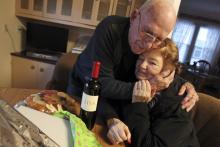
It’s been almost 70 years, but Marsha Kreuzman still remembers the moment she laid outside the steps of a Nazi crematorium wishing she could die.
Kreuzman had already lost her mother, father, and brother to the Holocaust, and death seemed inevitable, she said.
But then an American soldier picked up her 68-pound body and whisked her to safety.
“I wanted to kiss his hand and thank him,” she said. “From the first day I was liberated, I wanted to thank them, but I didn’t know who to thank.”
Since then, the now-90-year-old Holocaust survivor has been on a decades-long quest to find American soldiers who liberated the Mauthausen concentration camp, one that didn’t have any success until she met Joe Barbella, two months ago, quite by chance.
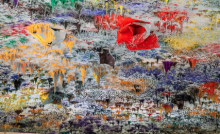
LONDON — Eight of the 47 countries that hold seats on the United Nations Human Rights Council imprisoned people in 2013 under laws that restrict religious freedom, according to a new report from Human Rights Without Frontiers International, a nonprofit advocacy organization based in Belgium.
The eight UNHRC member states on the group’s second annual World Freedom of Religion or Belief Prisoners List, released Monday, are Morocco, China, and Saudi Arabia (whose new three-year terms begin Wednesday), and current members India, Indonesia, Kazakhstan, Libya, and South Korea.
Hundreds of believers and atheists were imprisoned in these and 16 other countries for exercising religious freedom or freedom of expression rights related to religious issues, according to the report. These rights include the freedom to change religions, share beliefs, object to military service on conscientious grounds, worship, assemble, and associate freely. Violations related to religious defamation and blasphemy are also included in the report.
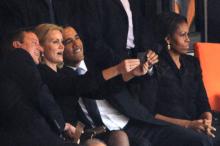
President Obama’s “selfie” with prime ministers Helle Thorning Schmidt of Denmark and David Cameron of Great Britain has been making the rounds on social media. Many of Obama’s detractors have taken the opportunity to criticize the President’s picture taking prowess, bringing on “Selfie-Gate.” Take John Kass of the Chicago Tribune, for example:
First lady Michelle Obama sits off to the side, somber, dignified, as the world remembers Mandela. Yet next to her like some goofy adolescent who hasn't yet been taught how to behave properly at a memorial service — her husband — is snapping a memorial to himself.
Hold on a minute there, Kass, because South Africa is teaching us a thing or two about how they “behave properly at a memorial service.” Sure they mourn.
But they also dance.
From the video and images that I’ve seen, there was festive atmosphere at Mandela’s memorial service. This leads me to wonder what “proper behavior” at this memorial service looks like.
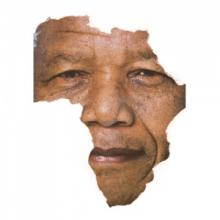
Today I had the great honor of saying a prayer at the memorial service for Nelson Mandela, the most important political leader of the 20th century. This was an honor, not only because of Mandela’s stature on the world’s stage, but because he was someone I admired very deeply and personally. His fight for justice and reconciliation is one that has inspired me in the work that we do at Sojourners.
There were several highlights of the service today. There were several choirs, two of which brought each mourner to their feet, clapping along to their versions of Shosholoza and Siyahamba. There were many beautiful speeches and recitations, including a reading of Maya Angelou’s poem for Mandela called “His Day is Done.”
But what stood out to me the most was the homily by Rev. Dr. Allan Boesak, Director of the Desmond Tutu Center at Christian Theological Seminary, Butler University. As he paid tribute to Mandela’s life and described his “long walk to freedom,” he punctuated his remarks with “it ain’t over, until God says it’s done,” a quote from Maurette Brown-Clark’s song of the same name.

Two French soldiers died as a wave of deadly revenge attacks involving rival Christian and Muslim groups has left the Central African Republic in chaos.
But a Roman Catholic archbishop said the fighting pitting the two groups is not about religion, but rather politics and power.
“The religious leaders warned against this risk” of religious conflict, said Nestor Desire Nongo-Aziagbia of Bossangoa in a telephone interview. “Political leaders have not paid attention to these warnings. They wanted to antagonize the Central African Republic along religious lines in order to remain in power.”
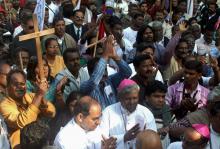
NEW DELHI — Police in India’s capital used water cannons and canes on peaceful Christian and Muslim leaders Wednesday while they were demanding equal constitutional protections.
Organized jointly by confederations of churches and Muslim groups in India, the demonstrators demanded affirmative action for Dalits (formerly “untouchables”) who have converted to Christianity or Islam.
Only Dalits who have converted to Hinduism, Sikhism, or Buddhism are entitled to affirmative action slots in jobs and educational institutions, among other protections.

ROME — It’s official, but no big surprise: Pope Francis is now the most-talked-about person on Facebook, according to information released Dec. 10 by the social media giant.
Pope Francis took the top spot, followed closely by Royal Baby George.
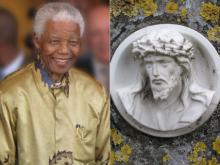
Few would deny Nelson Mandela’s greatness, but one of Britain’s best-known journalists, Dominic Lawson, has taken the media to task for comparing South Africa’s first black president to Jesus.
Writing on the eve of the departure of world leaders to Johannesburg to attend a memorial service for Mandela, who died last week, Lawson wrote in the Daily Mail: “He was a giant — but how absurd for the BBC to compare Mandela to Christ.”
Lawson singled out BBC presenter Evan Davis who told listeners on a Dec. 7 radio program that Mandela should be ranked alongside Jesus in “the pantheon of virtue.”
The BBC radio program included former U.S. President Jimmy Carter, who emphatically dismissed the notion of Mandela being on par with the founder of Christianity.
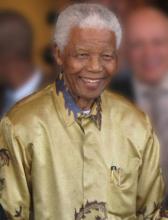
Nelson Mandela, the former South African president who died Thursday, had a deep connection with religious institutions.
Mandela was educated, first at Clarkebury and then at Healdtown, Methodist boarding schools that provided a Christian liberal arts education.
“Both were important influences on his life,” said Presiding Bishop Zipho Siwa of the Methodist Church of Southern Africa. “Indeed, after his time at Clarkebury, the young Mandela said his horizons had been broadened.”
In Cape Town, retired Anglican Archbishop Desmond Tutu said Mandela was mourned by South Africans, Africans, and the international community as a colossus of unimpeachable moral character and integrity.
“He preached a gospel of forgiveness and reconciliation,” Tutu wrote in a tribute on Allafrica.com.
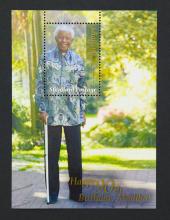
The world lost a hero yesterday. Nelson Mandela, 95, died at his home in Johannesburg, South Africa, after a long illness.
From prisoner of 27 years to President of his country, Mandela exhibited courage and vision for a country that had feared a bloodbath in its transition to a post-apartheid society. Mandela united the country through the Truth and Reconciliation Commission.
A less-noted aspect of Mandela’s work was his founding of The Elders on his 89th birthday. With a mission of “offer[ing] their collective influence and experience to support peace building, help address major causes of human suffering and promote the shared interests of humanity.” Mandela gathered Jimmy Carter, Kofi Annan, Mary Robinson, Desmond Tutu, Muhammed Yunus, and others to harvest the wisdom of their years for the good of the planet. Founding member Peter Gabriel further explained: “In traditional societies, the elders always had a role in conflict resolution, long-term thinking, and applying wisdom wherever it was needed. We are moving to this global village and yet we don’t have our global elders. The Elders can be a group who have the trust of the world, who can speak freely, be fiercely independent, and respond fast and flexibly in conflict situations.”
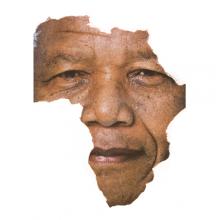
In response to the passing of Nelson Mandela, Jim Wallis, President of Sojourners, issued the following statement:
"Nelson Mandela was the most important political leader of the 20th century. While Roosevelt and Churchill helped protect the West and the world from Hitler’s Nazism, Mandela heroically exemplified the historic movement against colonialism and racism that oppressed the global south, depicted so dramatically in South Africa’s apartheid. And from a Christian point of view, Nelson Mandela combined justice and reconciliation like no other political leader of his time, shaped by the spiritual formation of 27 years in prison. Mandela’s life has blessed the world with courage and hope. For me, Nelson Mandela has been an ideal of what leaders can be. Being with him after his release from prison, and being present at his presidential inauguration, gave me a sense of a moral authority that I have never experienced with any other political leader."
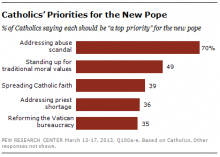
Pope Francis is creating a special commission to deal with the clergy sexual abuse crisis on a global scale, a step that comes amid growing criticism that Francis had not given sufficient attention to the scandal.
Boston Cardinal Sean O’Malley made the announcement on Thursday in the Vatican where he was meeting this week with Francis and the other members of the so-called “Gang of Eight” cardinals that the pope chose to help him reform the Roman Curia.
O’Malley, who is the U.S. bishop with perhaps the most credibility on the abuse issue, listed a range of programmatic ideas for the commission, whose members are expected to include lay people, mental health professionals, and other experts in the field as well as leading churchmen.
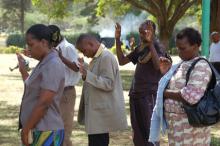
At prayer healing services in some Pentecostal churches, pastors invite people infected with HIV to come forward for a public healing, after which they burn the person’s anti-retroviral medications and declare the person cured.
The “cure” is not free, and some people say they shell out their life savings to receive a miracle blessing and quit taking the drugs.
“I believe people can be healed of all kinds of sickness, including HIV, through prayers,” said Pastor Joseph Maina of Agmo Prayer Mountain, a Pentecostal church on the outskirts of Nairobi. “We usually guide them. We don’t ask for money, but we ask them to leave some seed money that they please.”
But the controversial ceremonies are raising red flags as believers’ conditions worsen, and a debate has opened over whether science or religion should take the lead in the fight against the AIDS epidemic.
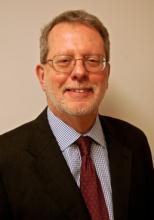
My first career: print journalism. Current status of that field: on life support.
My second career: pastoring neighborhood churches. Current status of that field: on life support.
My third career: writing and publishing books. Current status of that field: on life support.
My fourth career: implementing client-server data management systems. Current status of that field: on life support.
Do you see a trend here? I did. So now I try to stay nimble and to keep moving. My publishing business is entirely electronic. I have cycled through three websites and three subscription systems in 10 months. I do more of my church consulting online.
How can we save 40,000 lives in under three minutes?
That question served as the provocative title of Israeli medic Eli Beer's TEDMED talk. Beer is the founder and president of Israel-based United Hatzalah (which is Hebrew for "rescue"), a rapid response team of 2,000 skilled volunteers — EMTs who range professionally from "expensive lawyers to people who sell fish or shoes," he said to CNN Health.
Beer answered his question this way, "The average response time of a traditional ambulance is 12 to 15 minutes — we reduce it to less than three minutes. Our response is the fastest in the world. We call our approach a lifesaving flash mob. On motorcycles, traffic doesn't stop us. Nothing does."
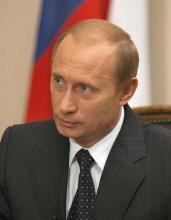
Next week’s summit between Pope Francis and Russian President Vladmir Putin may be the most important meeting between a pontiff and a visiting head of state in nearly a quarter of a century, with war-torn Syria expected to be the top priority.
Francis has met with more than a dozen heads of state or government as pontiff, and Putin has met with both Pope Benedict XVI and Pope John Paul II. But this meeting stands out.
It’s been just four years since full diplomatic ties were re-established between Russia and the Holy See, set against a backdrop of centuries of tension between the Vatican and the Russian Orthodox Church.
![Movie Poster for Hunger Games: Catching Fire. Courtesy Lionsgate [United States]](https://sojo.net/files/styles/medium/public/blog/9b07bf94-2ba3-11e3-af40-bc764e10b52f.jpg)
I cannot start a fire. Often, this is the case even with a dry match in my hand.
As a person of relative privilege from the West living in an age of microwaves and igniter switches, this would not generally be a problem, aside from the embarrassment such ineptitude might cause. It would, however, be a problem if I were, say, stranded in the East Tennessee countryside and left to fend for myself against an alliance of desperate, vengeful college students.
Such is the conundrum I face this approaching weekend with my participation in Carson-Newman University’s third annual Hunger Games.
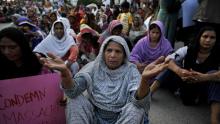
MY HEART WAS broken when I got the news on a Sunday in September: All Saints Church in Peshawar, Pakistan, had been attacked by two suicide bombers just after the Sunday service, as worshippers filtered out of the sanctuary. Eighty-five people were killed, including 34 women, seven children, and two Muslim police officers there to provide security. Later reports said the bombers were Sunni extremists.
In 1976, I was honored to start Youth for Christ in Peshawar. There were few Christians in this area near the Afghan border; Peshawar was not and is not a big town. Undoubtedly, some of the adults in and around the church when it was bombed were people I had met decades earlier.
News of the bombing confounded my memory of Peshawar 38 years ago. Religious plurality then was not perfect, but it was in great contrast to today. Christians, though few, served the Lord with some freedom. Youth for Christ held open-air rallies in the park, amplified by public-address speakers, with young people singing Christian songs with Bible messages to be heard by anyone within earshot. No security was needed, and truth be told both Muslim and Christian youth were in the audience and the choir.
The start of the second Gulf war in 2003, and subsequent military actions, changed everything. Reports say the church bombing in Peshawar was in retaliation for U.S. drone strikes that killed innocent men, women, and children, along with suspected terrorists, in that part of Pakistan. Peshawar is strategically located on the border with Afghanistan, not far from the famous Khyber Pass and only about 125 miles from where Osama bin Laden was killed.
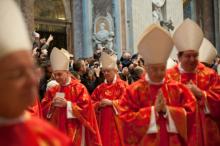
ROME — A spokeswoman for the National Security Agency denied reports from a leading Italian news magazine that U.S. spies may have listened in on conversations from inside the Vatican leading up to the March conclave that elected Pope Francis.
The newsweekly Panorama had reported in its Oct. 31 editions that the NSA tapped phones in the Santa Marta guesthouse where cardinals stayed before the conclave, as well as the cell phones of several cardinals, including Jorge Bergoglio, who became Pope Francis. The Panorama article did not identify its sources.
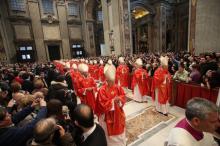
The National Security Agency spied on cardinals as they prepared to select the new pope — perhaps including even Cardinal Jorge Bergoglio, who emerged from last spring’s conclave as Pope Francis, a leading Italian news magazine reported in Wednesday’s editions.
Pope Francis still lives in the guesthouse, but the magazine did not speculate whether the phones there were still tapped.